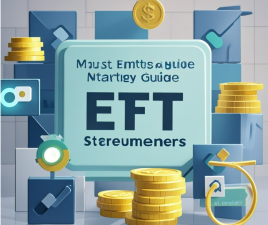TF Investment Guide: A must-have strategy for beginners
An exchange-traded fund (ETF) is a financial instrument that combines the advantages of stocks and mutual funds and is suitable for novice investors who want to diversify their investment risk and do not want to incur high costs. By trading publicly on an exchange, ETFs allow investors to operate as easily as buying and selling stocks, and invest in multiple underlying assets at once, providing high flexibility and diversity.
ETF Basics
The main feature of ETFs is that they are traded on an exchange and their price fluctuates in real time as market supply and demand change. Unlike mutual funds, ETF units can be bought and sold anytime like stocks, but they provide a mix of assets like mutual funds. This unique structure allows ETFs to offer the flexibility of stocks while enjoying the diversification benefits of the fund.
ETF compared with stocks and mutual funds
Compared with buying individual stocks outright, ETFs diversify risk by holding a basket of stocks, bonds or other assets, with relatively low investment barriers and are easier to use. Unlike traditional mutual funds, ETFs incur lower costs during trading and do not require a high initial investment. For novice investors, ETFs are an ideal vehicle to reduce costs and gain diversification.
Analysis of pros and cons of ETF investment
advantage
Trading flexibility: ETFs can be bought and sold at any time like stocks, providing investors with high liquidity.
Low cost: ETFs typically have lower management fees compared to other types of funds.
Diversification of risk: By investing in multiple assets at once, ETFs can help investors reduce the risk of a single asset.
shortcoming
Market risk: The value of ETFs will fluctuate with the overall market, and investors still need to bear some market risk.
Currency risk: For investors investing in international ETFs, currency fluctuations can affect investment returns.
Tracking error: Sometimes the performance of an ETF can be slightly different from the index it tracks, leading to tracking error.
How to choose the right ETF
When choosing an ETF, novice investors should consider a number of factors. First of all, the preference for large and liquid ETFs can ensure the convenience and cost effectiveness of buying and selling. In addition, it is also crucial to pay attention to the management fees of ETFs, as lower fees mean higher net returns. Finally, investors should pay attention to the discount and premium of ETFs and try to enter when the market price is close to the net value.
ETF investment strategy
There are several common ETF investment strategies that novice investors can consider:
Regular fixed investment: a fixed amount of money is invested in a fixed time each month, regardless of the rise and fall of the market, which can smooth the investment cost in the long run and is suitable for long-term investment.
Band operation: For experienced investors, you can try to buy low and sell high through technical analysis, but this strategy needs to be operated with caution.
Long-term holding: For investors who are optimistic about a certain industry or market for a long time, they can choose relevant ETFs and hold them for a long time to make full use of the time appreciation effect.
How to buy ETFs
Investors can buy ETFs through securities platforms at home and abroad. In the Taiwan market, for example, investors can buy Taiwanese ETFs through local brokerages, while US ETFs can be traded through overseas brokerages. Regardless of the market chosen, investors should do their homework and choose the platform that best suits their needs.
ETF as a combination of flexibility and diversity of investment vehicles, especially suitable for novice investors. It not only helps investors enter the market at a lower cost, but also reduces single risk by diversifying their portfolio. Therefore, whether you are new to the investment world or veteran looking to optimize your portfolio, ETFs are an option worth considering. Take action now to lay the foundation for your financial future.



_20240909112439A004.jpg)

